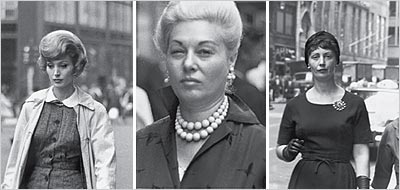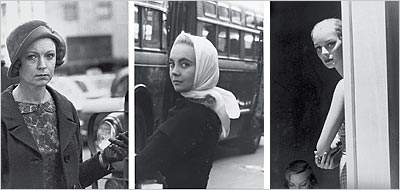
On almost every afternoon from 1952 to 1966, a transplanted Nebraskan named Angelo Rizzuto left his crummy rented room to snap pictures on the New York streets. The rest of the day he spent shunning company, writing delusional anti-Semitic letters to politicians, and striving to patent an improved stepladder, with the single-mindedness of a recluse and the meticulous obsessiveness of a paranoid schizophrenic. When he died in 1967, Rizzuto bequeathed his 60,000 photos (including almost daily self-portraits, like the one below) to the Library of Congress, where they sat in an annex basement until a photo historian named Michael Lesy unearthed them.

This month, W. W. Norton publishes 97 of those photographs in Angel’s World: The New York Photographs of Angelo Rizzuto. Let the experts parse whether Rizzuto was a great photographer or merely an interesting one; the rest of us can plunge into the intense, faintly foreign mid-century coiffure and formality of dress. We meet a portfolio of period-costumed women girded for their daily battles on the sidewalks of Manhattan, on the main floor of B. Altman, and at the corner butcher shop. Harried, haggard, distracted, and angry—or glamorously masked in full maquillage—the women often squint or avert their eyes in the face of Rizzuto’s unwanted scrutiny. For the viewer, meeting his unwilling subjects’ gaze is disquieting, but the images are beautiful—perhaps because Rizzuto saw in the women a shared melancholy that he took as a form of consent.